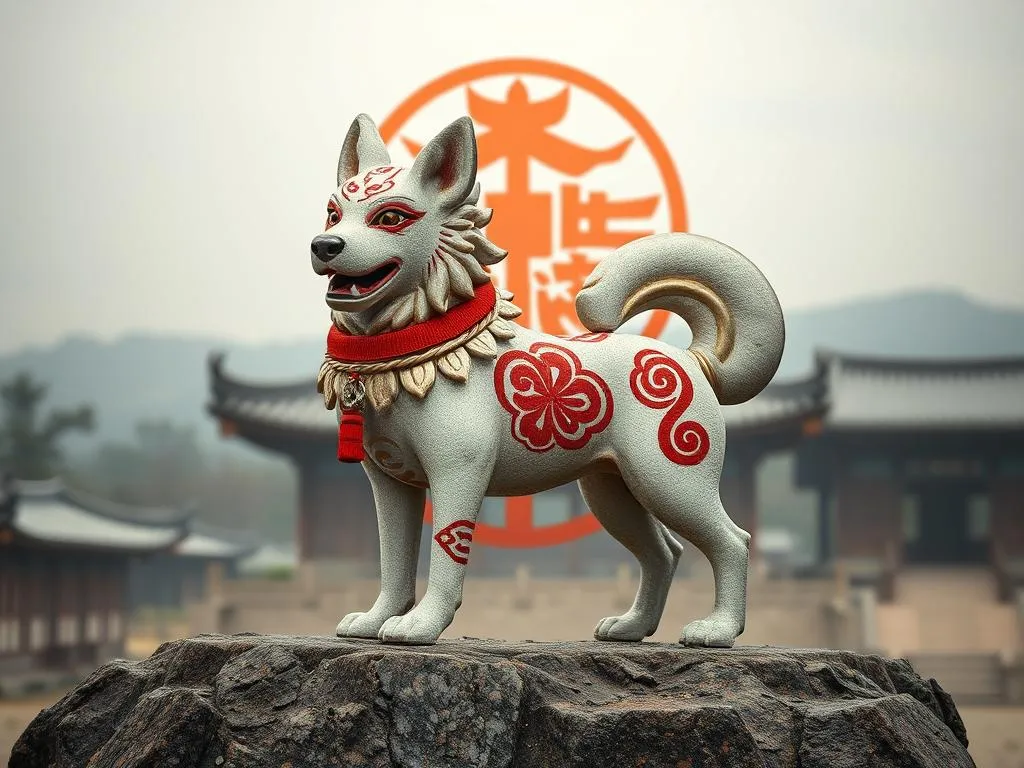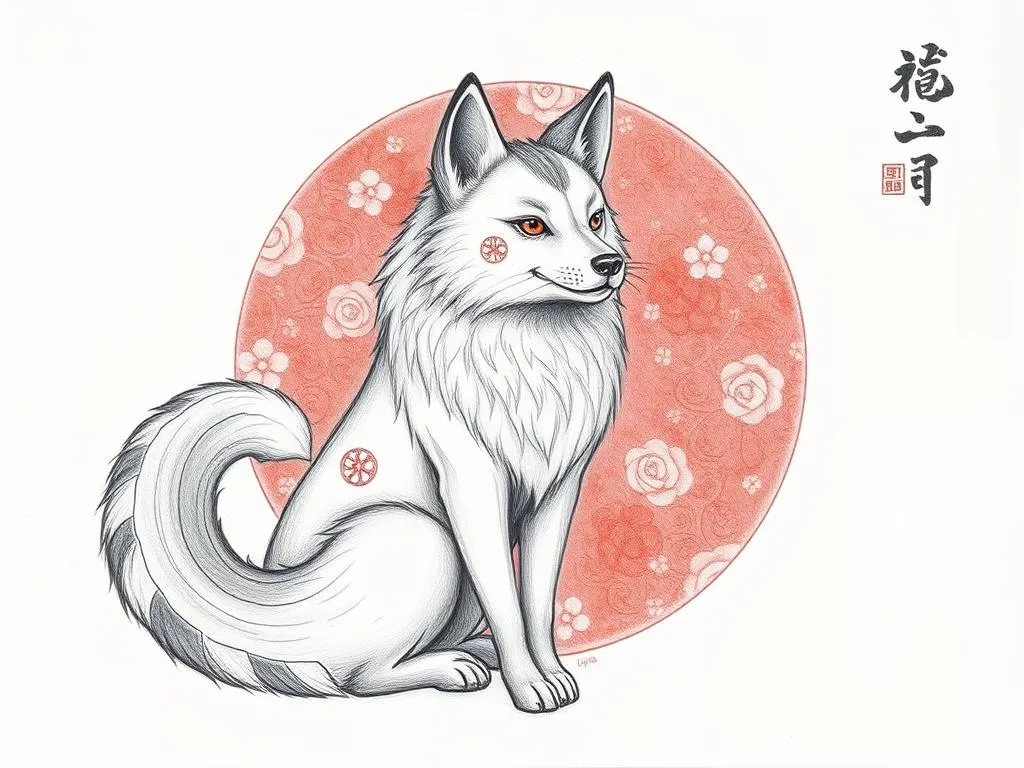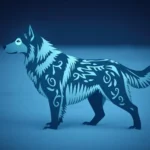The Korean Jindo: A Symbol of Loyalty and Resilience

Disclaimer: Some images on this website are AI-generated artworks and may not accurately represent real animals.
The Korean Jindo is not just a breed of dog; it is a cultural icon that embodies the essence of loyalty, resilience, and connection to nature. Known for its striking appearance and remarkable traits, the Jindo has a rich history and deep symbolism in Korean culture. This blog post will delve into the various aspects of the Jindo, exploring its origins, symbolism, and modern interpretations, while highlighting the profound meanings associated with this unique breed.
Understanding the Korean Jindo
Origin and History
The Korean Jindo hails from Jindo Island in South Korea, where it was first recognized for its exceptional hunting skills and loyalty to its owners. Historically, Jindos were used for hunting deer, boar, and even small game, showcasing their agility and intelligence. Over time, these dogs became revered not only for their utilitarian purposes but also for their deep bond with the Korean people.
In Korean culture, the Jindo is celebrated for its unwavering loyalty and resilience. Many stories and folklore emphasize the Jindo’s dedication to its family, often depicting them as heroic figures. This reputation has solidified the Jindo’s status as a national treasure, and in 1997, it was designated as a Natural Monument of South Korea.
Physical Characteristics
The Korean Jindo is a medium-sized dog with a well-proportioned body, characterized by its strong, muscular build. Below is a table that outlines the key physical characteristics of the Jindo, setting it apart from other breeds.
| Feature | Description |
|---|---|
| Size | Medium (18-24 inches at the shoulder) |
| Weight | 30-60 pounds |
| Coat | Short, dense, and double-layered |
| Color | Various colors, including white, black, and brindle |
| Tail | Curled over the back |
| Ears | Upright and triangular |
These physical traits not only contribute to the Jindo’s striking appearance but also enhance its capabilities as a hunting dog. The Jindo’s agility and endurance make it a formidable companion in the wild, while its loyalty ensures a strong bond with its human family.

Symbolism & Spiritual Meaning
Loyalty and Devotion
One of the most profound aspects of the Korean Jindo is its representation of loyalty and devotion. This breed is known for its deep attachment to its family, often displaying protective instincts and unwavering loyalty. There are numerous cultural stories and legends that highlight this trait.
One such story tells of a Jindo that waited for its owner at a train station for several years, refusing to leave despite the owner’s absence. This tale is a testament to the Jindo’s commitment to its human companions, symbolizing a bond that transcends time and distance. The Jindo’s loyalty is not just a trait; it is a symbol of the love and dedication that exists in relationships, making it a cherished companion in Korean households.
Independence and Courage
In addition to loyalty, the Korean Jindo embodies independence and courage. This breed is known for its strong will and ability to think for itself. Jindos often demonstrate a desire for autonomy, which can sometimes be mistaken for stubbornness. However, this independent nature is a reflection of their intelligence and adaptability.
The symbolism of courage is deeply embedded in the Jindo’s character. These dogs are often depicted as brave protectors, willing to face challenges head-on. Their fearless demeanor in the face of danger has made them legendary figures in Korean folklore, symbolizing the courage that resides within us all.
Connection to Nature
The Korean Jindo has a harmonious relationship with nature, serving as a symbol of balance and connection to the environment. Historically, Jindos played a vital role in hunting, showcasing their instinctual abilities and deep understanding of their surroundings. This bond with nature extends beyond hunting; it signifies a deeper spiritual connection.
In various cultural contexts, the Jindo is seen as a mediator between humans and the natural world. This connection is often reflected in art and literature, where the Jindo is portrayed as a guardian of nature, embodying the spirit of the wilderness. Such symbolism enriches the understanding of the Jindo as not only a companion but also as a vital part of the ecosystem.
The Korean Jindo in Dreams
Common Dream Scenarios
Dreaming of a Korean Jindo can carry significant meanings, often reflecting the dreamer’s personal connections and emotions. Here are some common scenarios and their interpretations:
- Dreaming of a Jindo running freely: This may symbolize a longing for freedom and independence in your life.
- Dreaming of a Jindo protecting you: This can represent feelings of safety and security, highlighting your support systems.
- Dreaming of a Jindo in distress: Such a dream might indicate unresolved issues or fears related to loyalty and trust in relationships.
Cultural Significance in Dreams
In Korean dream interpretation traditions, the Korean Jindo holds special significance. Jindos are often viewed as symbols of fidelity and protection in dreams. If a Jindo appears in a dream, it may suggest that the dreamer is seeking guidance or reassurance in their waking life.
The following table summarizes common dream scenarios involving Jindos and their interpretations:
| Dream Scenario | Interpretation |
|---|---|
| Jindo running freely | Desire for freedom and independence |
| Jindo protecting you | Feeling safe and secure |
| Jindo in distress | Unresolved issues related to loyalty |
| Jindo interacting with nature | Connection with the environment |
Understanding these dream interpretations can provide insight into one’s emotional state and relationships, emphasizing the deeper meanings associated with the Korean Jindo.
Modern Interpretations
The Jindo as a Family Pet
In contemporary society, the Korean Jindo is increasingly recognized as a loyal and loving family pet. Their attributes make them ideal companions for those seeking a dog that is both protective and affectionate. Jindos are known for their intelligence, making them relatively easy to train, although their independent nature can pose challenges.
Families appreciate the Jindo’s playful demeanor and ability to bond with children, providing both companionship and a watchful eye. Their loyalty ensures that they are always ready to protect their family, further solidifying their reputation as excellent family dogs.
Cultural Representation in Media
The Korean Jindo has found its place in various forms of media, including films, books, and art. These representations often highlight the breed’s loyalty and courage, reinforcing its status as a symbol of devotion in Korean culture. Movies featuring Jindos often depict them as heroic figures, showcasing their ability to protect their owners and navigate challenging situations.
Such cultural representations play a significant role in shaping public perception of the Jindo, portraying it as not just a pet but as a guardian and a symbol of resilience. This portrayal enhances the breed’s mystique, elevating its status as a beloved figure in both Korean and global culture.
Key Takeaways
The Korean Jindo is a remarkable breed that embodies various qualities and symbolism. Here are some key takeaways regarding the Jindo’s significance:
- Loyalty: Jindos are renowned for their unwavering loyalty and devotion to their families.
- Independence: Their independent nature is a reflection of their intelligence and adaptability.
- Courage: Jindos symbolize bravery, often depicted as protectors in folklore.
- Connection to Nature: They represent a harmonious relationship with the environment, serving as guardians of nature.
- Cultural Significance: The Jindo holds a revered place in Korean culture, celebrated in stories, dreams, and media.
Conclusion
The enduring legacy of the Korean Jindo is a testament to its profound symbolism and significance in both Korean culture and the hearts of dog lovers worldwide. From its historical roles as a hunting companion to its modern-day status as a cherished family pet, the Jindo embodies qualities that resonate deeply with human emotions.
As we continue to appreciate and understand the deeper meanings behind this remarkable breed, we are reminded of the timeless values of loyalty, courage, and connection—values that transcend cultures and enrich our lives. The Korean Jindo stands as a symbol of resilience, inviting us all to embrace the qualities it represents in our relationships with others and the world around us.







